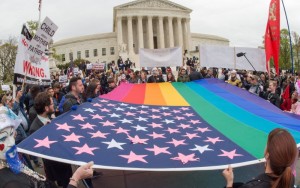Supreme Court says Kentucky clerk can’t deny same-sex marriage licenses
Considero que no es que por ganar o haber sido designado en el puesto, este le pertenezca a ella y, desde esa nueva posición, ella pueda decidir a quien atender y a quien no. El ejercicio del servicio público no se trata de opciones (It’s not about what you believe), sino un deber y como tal no debe discriminarse a ninguna persona respecto de los bienes y servicios que el Estado brinda a sus ciudadanos.
El servicio público es imperativo para todo servidor civil. La administración pública y el servicio civil se caracterizan por la objetividad que se materializa en el hecho de evitar que elementos personales o individuales afecten el criterio del servidor civil al momento de tomar decisiones.
Es como se dice: “pensar con la razón y no tanto con el corazón”. Ello no obsta que el servidor civil tenga un espectro de acción que le lleve a hacer lo correcto pero sin afectar negativa e injustificadamente la situación jurídica del Estado o los derechos del ciudadano.
The U.S. Supreme Court on Monday turned down a Kentucky county clerk’s request for an emergency order allowing her to continue to deny marriage licenses to same-sex couples while she appeals a federal judge’s order requiring her to do so. USA TODAY
WASHINGTON — The Supreme Court refused Monday to let a Kentucky county clerk deny marriage licenses to same-sex couples because of what she said were her religious beliefs.
The ruling, made without comment or any apparent dissents, is an early indication that while some push-back against gay marriage on religious grounds may be upheld, the justices won’t tolerate it from public officials.
In one of the first tests of the court’s June 26 decision upholding the rights of gays and lesbians to marry, Rowan County Clerk Kim Davis had argued that her Christian faith prevented her from recognizing such marriages.
Rather than deny only same-sex couples, which the high court had said would be unconstitutional, she chose to stop issuing marriage licenses altogether — and was sued by same-sex and opposite-sex couples.
Davis argued that her refusal was not a major burden for the couples, since Kentucky has about 136 other marriage-licensing locations. But federal district and appeals court judges had refused to grant her wish, forcing Davis to seek the Supreme Court’s intervention. Her petition was filed late last week by the conservative legal group Liberty Counsel.
“If a (same-sex marriage) license is issued with Davis’ name, authorization, and approval, no one can unring that bell,” the petition said. “That searing act of validation would forever echo in her conscience.”
The high court’s ruling doesn’t end Davis’ challenge, still pending at the U.S. Court of Appeals for the 6th Circuit — the same appellate court that previously allowed Kentucky, Michigan, Ohio and Tennessee to block same-sex marriage before being overruled by the Supreme Court. But it means that in the meantime, her office must issue marriage licenses.
En: usatoday

